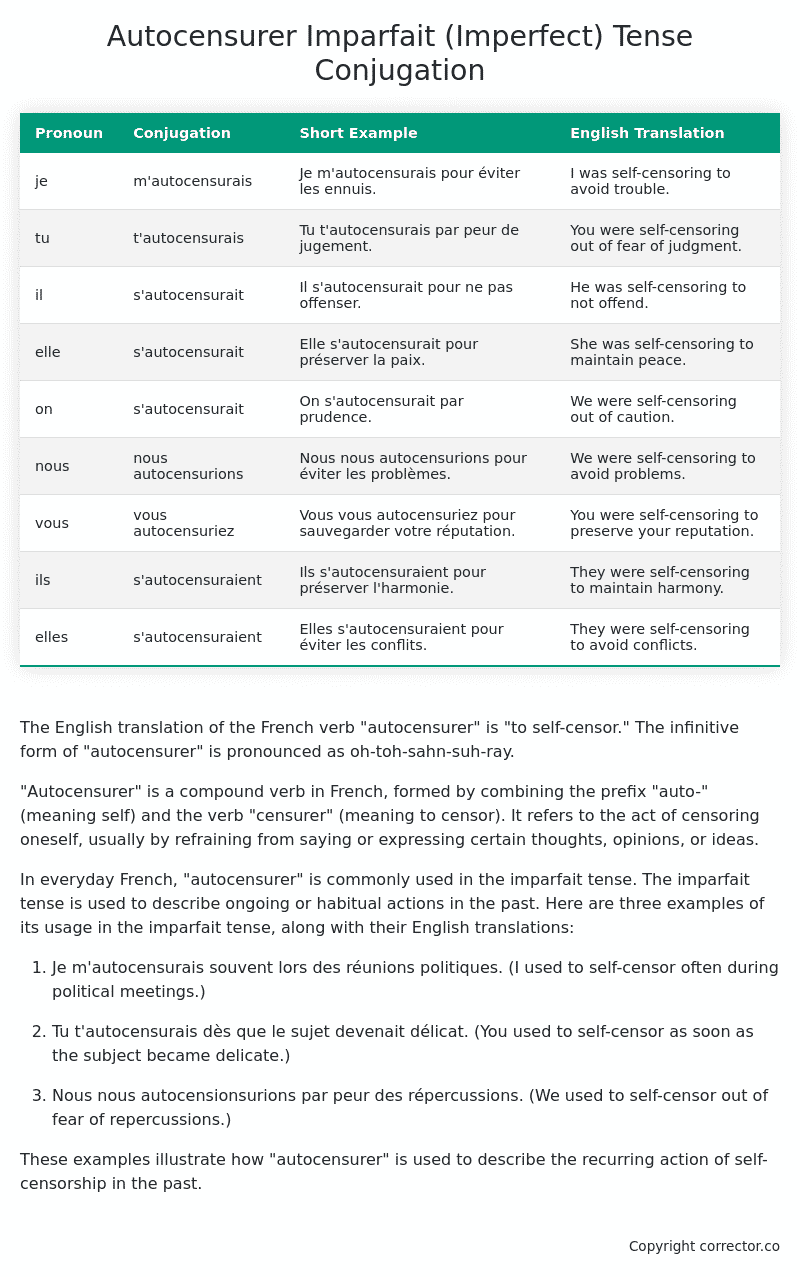Imparfait (Imperfect) Tense Conjugation of the French Verb autocensurer
Introduction to the verb autocensurer
The English translation of the French verb “autocensurer” is “to self-censor.” The infinitive form of “autocensurer” is pronounced as oh-toh-sahn-suh-ray.
“Autocensurer” is a compound verb in French, formed by combining the prefix “auto-” (meaning self) and the verb “censurer” (meaning to censor). It refers to the act of censoring oneself, usually by refraining from saying or expressing certain thoughts, opinions, or ideas.
In everyday French, “autocensurer” is commonly used in the imparfait tense. The imparfait tense is used to describe ongoing or habitual actions in the past. Here are three examples of its usage in the imparfait tense, along with their English translations:
-
Je m’autocensurais souvent lors des réunions politiques.
(I used to self-censor often during political meetings.) -
Tu t’autocensurais dès que le sujet devenait délicat.
(You used to self-censor as soon as the subject became delicate.) -
Nous nous autocensionsurions par peur des répercussions.
(We used to self-censor out of fear of repercussions.)
These examples illustrate how “autocensurer” is used to describe the recurring action of self-censorship in the past.
Table of the Imparfait (Imperfect) Tense Conjugation of autocensurer
| Pronoun | Conjugation | Short Example | English Translation |
|---|---|---|---|
| je | m’autocensurais | Je m’autocensurais pour éviter les ennuis. | I was self-censoring to avoid trouble. |
| tu | t’autocensurais | Tu t’autocensurais par peur de jugement. | You were self-censoring out of fear of judgment. |
| il | s’autocensurait | Il s’autocensurait pour ne pas offenser. | He was self-censoring to not offend. |
| elle | s’autocensurait | Elle s’autocensurait pour préserver la paix. | She was self-censoring to maintain peace. |
| on | s’autocensurait | On s’autocensurait par prudence. | We were self-censoring out of caution. |
| nous | nous autocensurions | Nous nous autocensurions pour éviter les problèmes. | We were self-censoring to avoid problems. |
| vous | vous autocensuriez | Vous vous autocensuriez pour sauvegarder votre réputation. | You were self-censoring to preserve your reputation. |
| ils | s’autocensuraient | Ils s’autocensuraient pour préserver l’harmonie. | They were self-censoring to maintain harmony. |
| elles | s’autocensuraient | Elles s’autocensuraient pour éviter les conflits. | They were self-censoring to avoid conflicts. |
Other Conjugations for Autocensurer.
Le Present (Present Tense) Conjugation of the French Verb autocensurer
Imparfait (Imperfect) Tense Conjugation of the French Verb autocensurer (You’re reading it right now!)
Passé Simple (Simple Past) Tense Conjugation of the French Verb autocensurer
Passé Composé (Present Perfect) Tense Conjugation of the French Verb autocensurer
Futur Simple (Simple Future) Tense Conjugation of the French Verb autocensurer
Futur Proche (Near Future) Tense Conjugation of the French Verb autocensurer
Plus-que-parfait (Pluperfect) Tense Conjugation of the French Verb autocensurer
Passé Antérieur (Past Anterior) Tense Conjugation of the French Verb autocensurer
Futur Antérieur (Future Anterior) Tense Conjugation of the French Verb autocensurer
Subjonctif Présent (Subjunctive Present) Tense Conjugation of the French Verb autocensurer
Subjonctif Passé (Subjunctive Past) Tense Conjugation of the French Verb autocensurer
Subjonctif Imparfait (Subjunctive Imperfect) Tense Conjugation of the French Verb autocensurer
Conditionnel Présent (Conditional Present) Tense Conjugation of the French Verb autocensurer
Conditionnel Passé (Conditional Past) Tense Conjugation of the French Verb autocensurer
Conditionnel Passé II (Conditional Past II) Tense Conjugation of the French Verb autocensurer
L’impératif Présent (Imperative Present) Tense Conjugation of the French Verb autocensurer
L’impératif Passé (Imperative Past) Tense Conjugation of the French Verb autocensurer
L’infinitif Présent (Infinitive Present) Tense Conjugation of the French Verb autocensurer
L’infinitif Passé (Infinitive Past) Tense Conjugation of the French Verb autocensurer
Le Participe Présent (Present Participle) Tense Conjugation of the French Verb autocensurer
Le Participe Passé (Past Participle) Tense Conjugation of the French Verb autocensurer
Struggling with French verbs or the language in general? Why not use our free French Grammar Checker – no registration required!
Get a FREE Download Study Sheet of this Conjugation 🔥
Simply right click the image below, click “save image” and get your free reference for the autocensurer imparfait tense conjugation!

Autocensurer – About the French Imparfait Tense
NOTE: To take a deep dive into all the French tenses then see our article on Mastering French Tense Conjugation.
Formation of the Imparfait Tense
For regular -er verbs:
For regular -ir verbs
For regular -re verbs
Common Everyday Usage Patterns
Description of Past Habits
Background Information
Mental and Emotional States
It’s employed to express emotions, thoughts, or physical sensations in the past. For example: “J’étais content quand il est arrivé.” (I was happy when he arrived.)
Ongoing Actions
Points to Note About the Imparfait Tense
Passé Composé vs. Imparfait
Conditional
Si Clauses
Narration
I hope you enjoyed this article on the verb autocensurer. Still in a learning mood? Check out another TOTALLY random French verb imparfait conjugation!


